Professional Development Report: MNG10 - Career Goal and Plan
VerifiedAdded on 2022/10/09
|14
|3742
|19
Report
AI Summary
This report, prepared for the MNG10 course, presents a comprehensive professional development plan, aiming to identify the student's strengths, career goals, and potential internship opportunities. The report utilizes the SODI model, encompassing self-awareness, opportunity awareness, and decision-making stages. The self-awareness section includes personality assessment via MBTI, identifying the student as a protagonist with strong leadership qualities and high emotional intelligence. The opportunity awareness segment focuses on a managerial career in the Australian retail industry, analyzing industry trends and potential job roles. The report also details the student's values, motivators, and leadership style, and how these factors align with career development theories. The student's goal is to work in retail management and has identified various career opportunities within the industry. The report also identifies the challenges and opportunities in the retail sector.
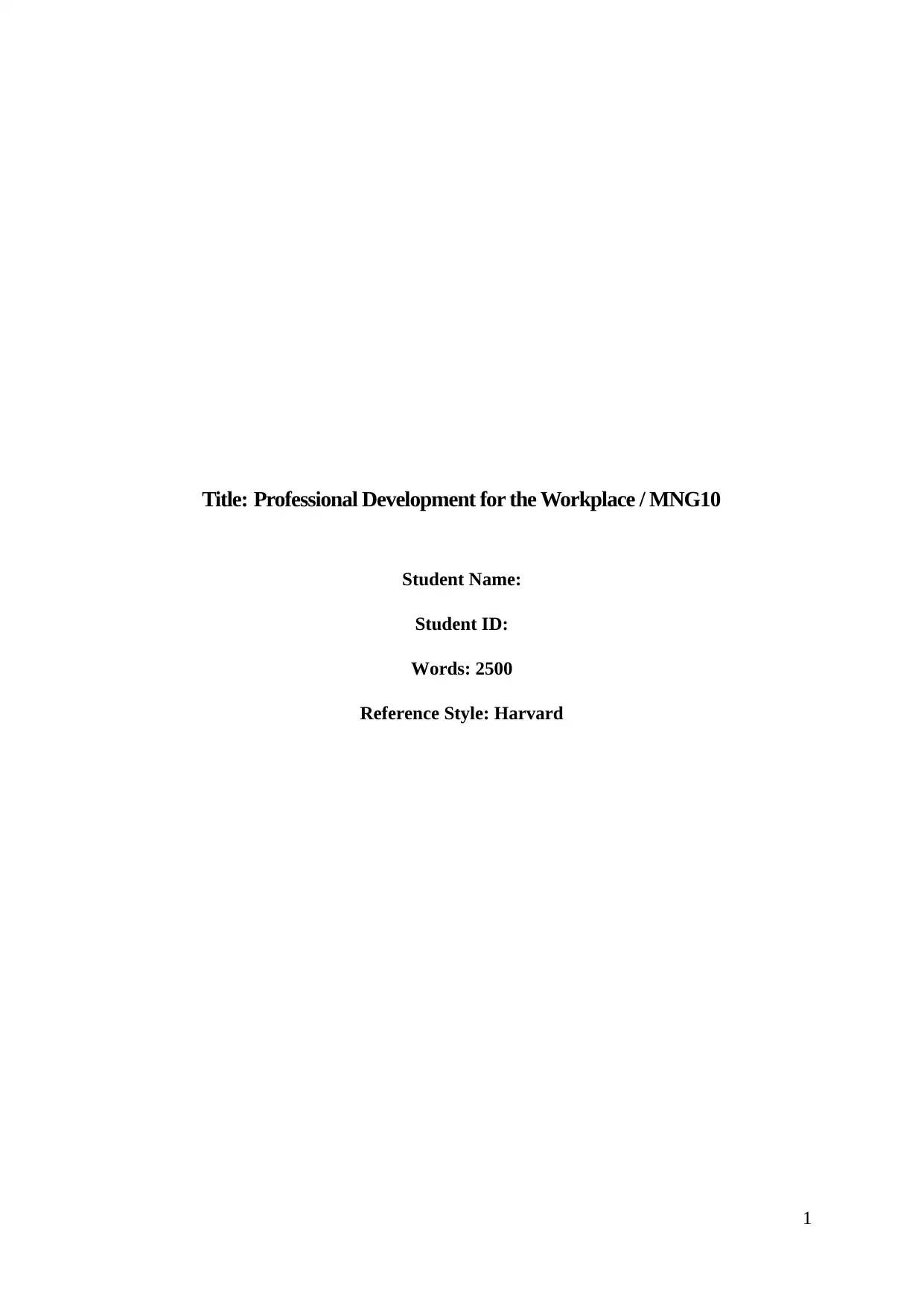
Title: Professional Development for the Workplace / MNG10
Student Name:
Student ID:
Words: 2500
Reference Style: Harvard
1
Student Name:
Student ID:
Words: 2500
Reference Style: Harvard
1
Paraphrase This Document
Need a fresh take? Get an instant paraphrase of this document with our AI Paraphraser
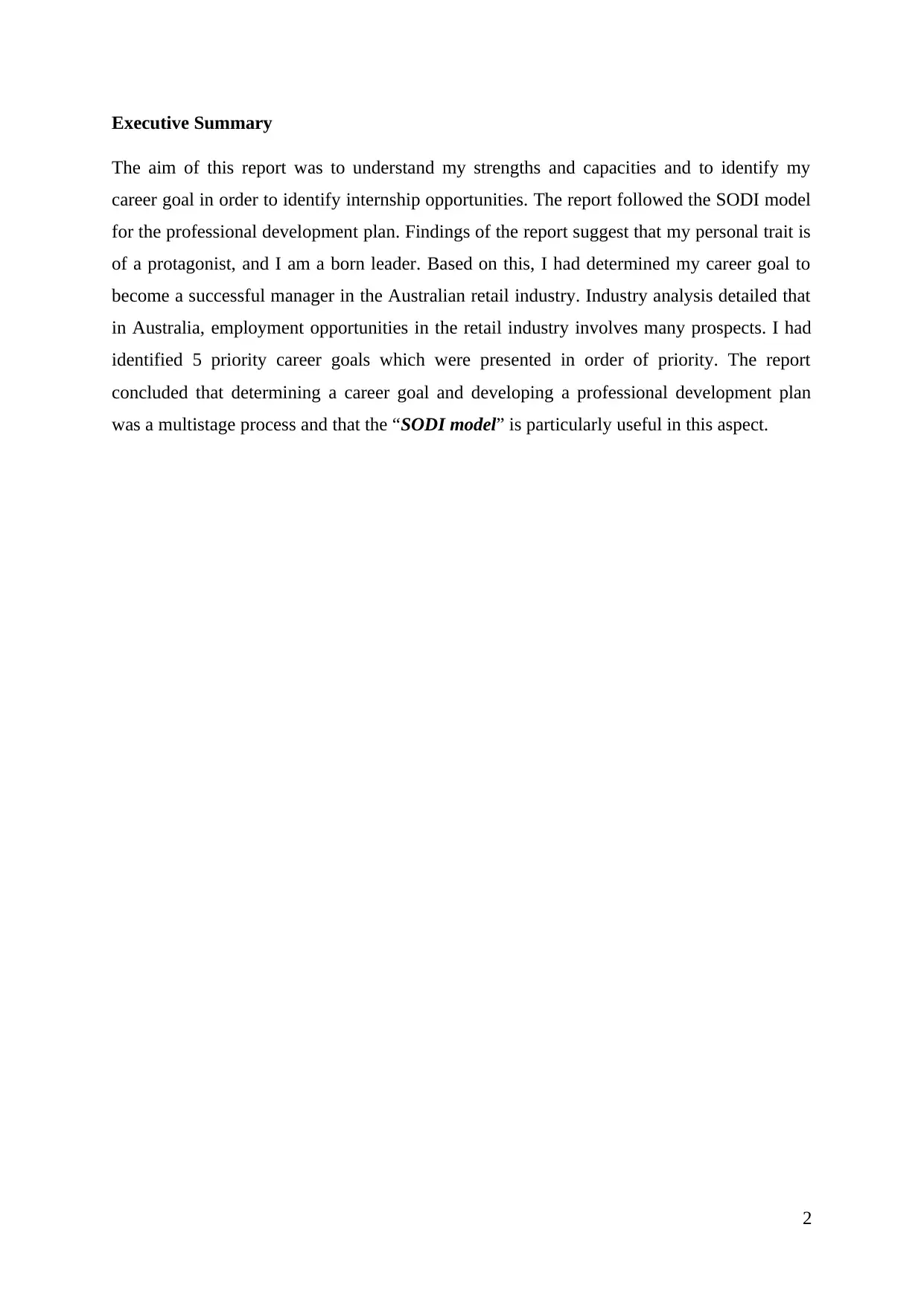
Executive Summary
The aim of this report was to understand my strengths and capacities and to identify my
career goal in order to identify internship opportunities. The report followed the SODI model
for the professional development plan. Findings of the report suggest that my personal trait is
of a protagonist, and I am a born leader. Based on this, I had determined my career goal to
become a successful manager in the Australian retail industry. Industry analysis detailed that
in Australia, employment opportunities in the retail industry involves many prospects. I had
identified 5 priority career goals which were presented in order of priority. The report
concluded that determining a career goal and developing a professional development plan
was a multistage process and that the “SODI model” is particularly useful in this aspect.
2
The aim of this report was to understand my strengths and capacities and to identify my
career goal in order to identify internship opportunities. The report followed the SODI model
for the professional development plan. Findings of the report suggest that my personal trait is
of a protagonist, and I am a born leader. Based on this, I had determined my career goal to
become a successful manager in the Australian retail industry. Industry analysis detailed that
in Australia, employment opportunities in the retail industry involves many prospects. I had
identified 5 priority career goals which were presented in order of priority. The report
concluded that determining a career goal and developing a professional development plan
was a multistage process and that the “SODI model” is particularly useful in this aspect.
2
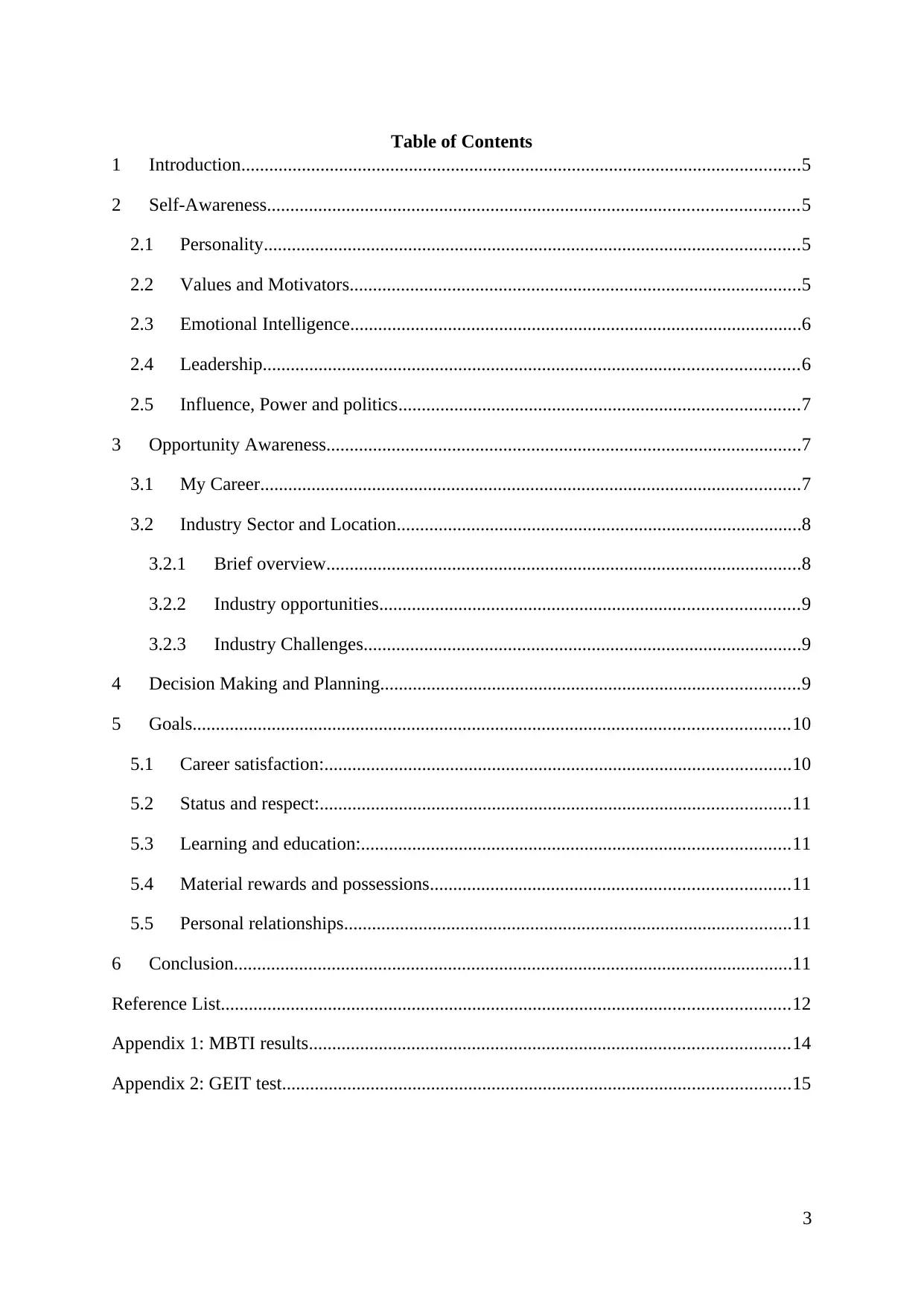
Table of Contents
1 Introduction........................................................................................................................5
2 Self-Awareness..................................................................................................................5
2.1 Personality...................................................................................................................5
2.2 Values and Motivators.................................................................................................5
2.3 Emotional Intelligence.................................................................................................6
2.4 Leadership...................................................................................................................6
2.5 Influence, Power and politics......................................................................................7
3 Opportunity Awareness......................................................................................................7
3.1 My Career....................................................................................................................7
3.2 Industry Sector and Location.......................................................................................8
3.2.1 Brief overview......................................................................................................8
3.2.2 Industry opportunities..........................................................................................9
3.2.3 Industry Challenges..............................................................................................9
4 Decision Making and Planning..........................................................................................9
5 Goals................................................................................................................................10
5.1 Career satisfaction:....................................................................................................10
5.2 Status and respect:.....................................................................................................11
5.3 Learning and education:............................................................................................11
5.4 Material rewards and possessions.............................................................................11
5.5 Personal relationships................................................................................................11
6 Conclusion........................................................................................................................11
Reference List..........................................................................................................................12
Appendix 1: MBTI results.......................................................................................................14
Appendix 2: GEIT test.............................................................................................................15
3
1 Introduction........................................................................................................................5
2 Self-Awareness..................................................................................................................5
2.1 Personality...................................................................................................................5
2.2 Values and Motivators.................................................................................................5
2.3 Emotional Intelligence.................................................................................................6
2.4 Leadership...................................................................................................................6
2.5 Influence, Power and politics......................................................................................7
3 Opportunity Awareness......................................................................................................7
3.1 My Career....................................................................................................................7
3.2 Industry Sector and Location.......................................................................................8
3.2.1 Brief overview......................................................................................................8
3.2.2 Industry opportunities..........................................................................................9
3.2.3 Industry Challenges..............................................................................................9
4 Decision Making and Planning..........................................................................................9
5 Goals................................................................................................................................10
5.1 Career satisfaction:....................................................................................................10
5.2 Status and respect:.....................................................................................................11
5.3 Learning and education:............................................................................................11
5.4 Material rewards and possessions.............................................................................11
5.5 Personal relationships................................................................................................11
6 Conclusion........................................................................................................................11
Reference List..........................................................................................................................12
Appendix 1: MBTI results.......................................................................................................14
Appendix 2: GEIT test.............................................................................................................15
3
⊘ This is a preview!⊘
Do you want full access?
Subscribe today to unlock all pages.

Trusted by 1+ million students worldwide
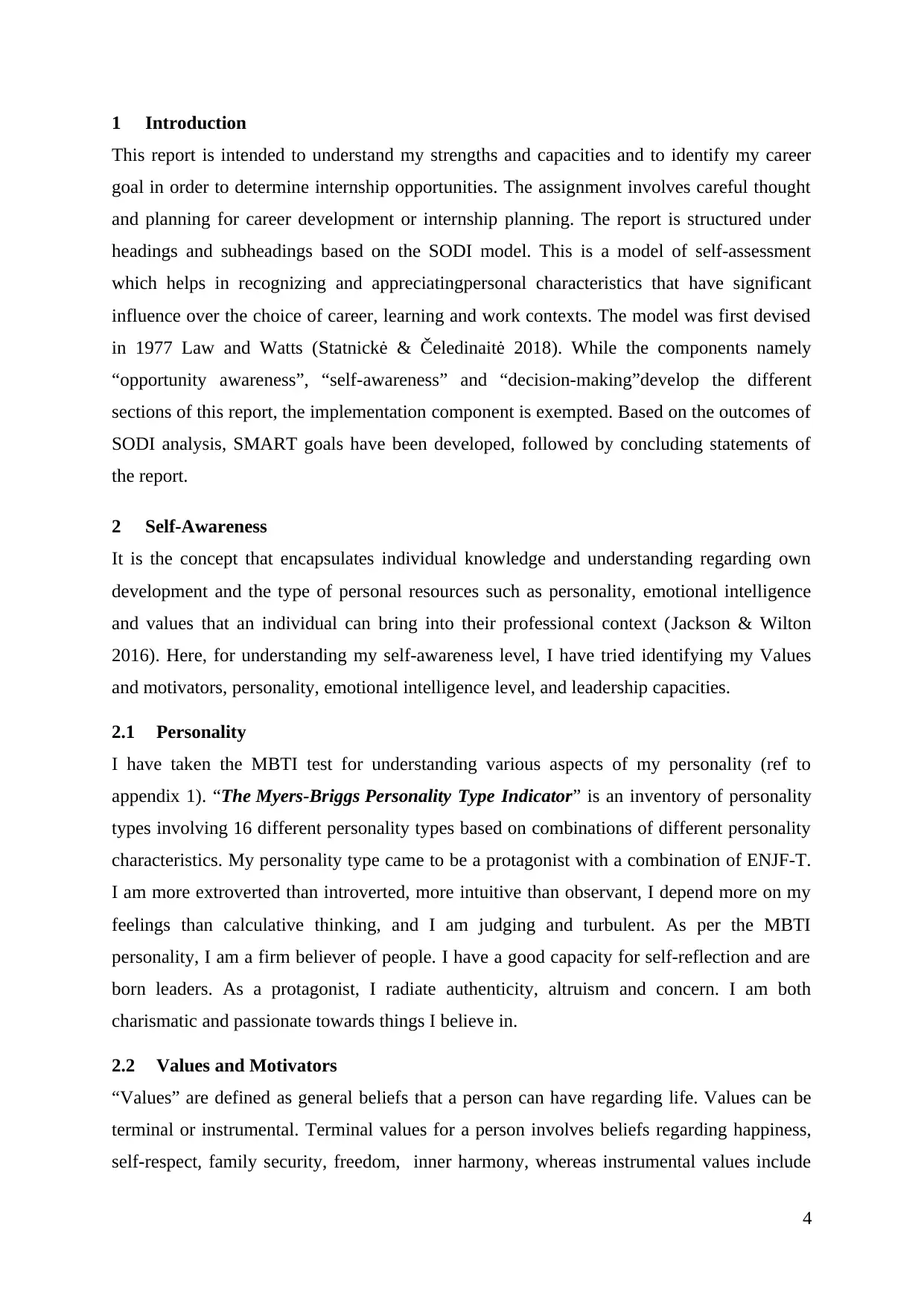
1 Introduction
This report is intended to understand my strengths and capacities and to identify my career
goal in order to determine internship opportunities. The assignment involves careful thought
and planning for career development or internship planning. The report is structured under
headings and subheadings based on the SODI model. This is a model of self-assessment
which helps in recognizing and appreciatingpersonal characteristics that have significant
influence over the choice of career, learning and work contexts. The model was first devised
in 1977 Law and Watts (Statnickė & Čeledinaitė 2018). While the components namely
“opportunity awareness”, “self-awareness” and “decision-making”develop the different
sections of this report, the implementation component is exempted. Based on the outcomes of
SODI analysis, SMART goals have been developed, followed by concluding statements of
the report.
2 Self-Awareness
It is the concept that encapsulates individual knowledge and understanding regarding own
development and the type of personal resources such as personality, emotional intelligence
and values that an individual can bring into their professional context (Jackson & Wilton
2016). Here, for understanding my self-awareness level, I have tried identifying my Values
and motivators, personality, emotional intelligence level, and leadership capacities.
2.1 Personality
I have taken the MBTI test for understanding various aspects of my personality (ref to
appendix 1). “The Myers-Briggs Personality Type Indicator” is an inventory of personality
types involving 16 different personality types based on combinations of different personality
characteristics. My personality type came to be a protagonist with a combination of ENJF-T.
I am more extroverted than introverted, more intuitive than observant, I depend more on my
feelings than calculative thinking, and I am judging and turbulent. As per the MBTI
personality, I am a firm believer of people. I have a good capacity for self-reflection and are
born leaders. As a protagonist, I radiate authenticity, altruism and concern. I am both
charismatic and passionate towards things I believe in.
2.2 Values and Motivators
“Values” are defined as general beliefs that a person can have regarding life. Values can be
terminal or instrumental. Terminal values for a person involves beliefs regarding happiness,
self-respect, family security, freedom, inner harmony, whereas instrumental values include
4
This report is intended to understand my strengths and capacities and to identify my career
goal in order to determine internship opportunities. The assignment involves careful thought
and planning for career development or internship planning. The report is structured under
headings and subheadings based on the SODI model. This is a model of self-assessment
which helps in recognizing and appreciatingpersonal characteristics that have significant
influence over the choice of career, learning and work contexts. The model was first devised
in 1977 Law and Watts (Statnickė & Čeledinaitė 2018). While the components namely
“opportunity awareness”, “self-awareness” and “decision-making”develop the different
sections of this report, the implementation component is exempted. Based on the outcomes of
SODI analysis, SMART goals have been developed, followed by concluding statements of
the report.
2 Self-Awareness
It is the concept that encapsulates individual knowledge and understanding regarding own
development and the type of personal resources such as personality, emotional intelligence
and values that an individual can bring into their professional context (Jackson & Wilton
2016). Here, for understanding my self-awareness level, I have tried identifying my Values
and motivators, personality, emotional intelligence level, and leadership capacities.
2.1 Personality
I have taken the MBTI test for understanding various aspects of my personality (ref to
appendix 1). “The Myers-Briggs Personality Type Indicator” is an inventory of personality
types involving 16 different personality types based on combinations of different personality
characteristics. My personality type came to be a protagonist with a combination of ENJF-T.
I am more extroverted than introverted, more intuitive than observant, I depend more on my
feelings than calculative thinking, and I am judging and turbulent. As per the MBTI
personality, I am a firm believer of people. I have a good capacity for self-reflection and are
born leaders. As a protagonist, I radiate authenticity, altruism and concern. I am both
charismatic and passionate towards things I believe in.
2.2 Values and Motivators
“Values” are defined as general beliefs that a person can have regarding life. Values can be
terminal or instrumental. Terminal values for a person involves beliefs regarding happiness,
self-respect, family security, freedom, inner harmony, whereas instrumental values include
4
Paraphrase This Document
Need a fresh take? Get an instant paraphrase of this document with our AI Paraphraser
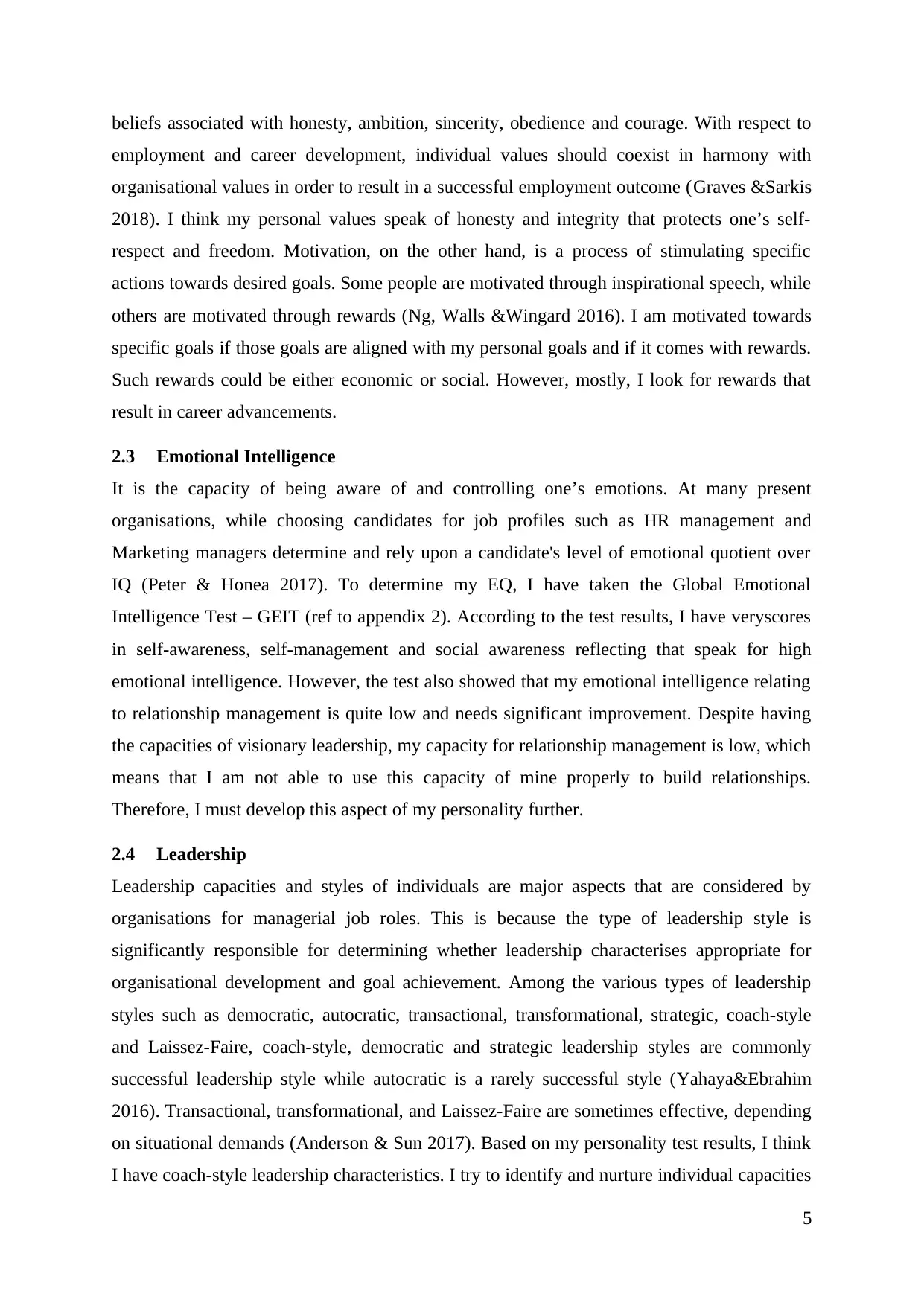
beliefs associated with honesty, ambition, sincerity, obedience and courage. With respect to
employment and career development, individual values should coexist in harmony with
organisational values in order to result in a successful employment outcome (Graves &Sarkis
2018). I think my personal values speak of honesty and integrity that protects one’s self-
respect and freedom. Motivation, on the other hand, is a process of stimulating specific
actions towards desired goals. Some people are motivated through inspirational speech, while
others are motivated through rewards (Ng, Walls &Wingard 2016). I am motivated towards
specific goals if those goals are aligned with my personal goals and if it comes with rewards.
Such rewards could be either economic or social. However, mostly, I look for rewards that
result in career advancements.
2.3 Emotional Intelligence
It is the capacity of being aware of and controlling one’s emotions. At many present
organisations, while choosing candidates for job profiles such as HR management and
Marketing managers determine and rely upon a candidate's level of emotional quotient over
IQ (Peter & Honea 2017). To determine my EQ, I have taken the Global Emotional
Intelligence Test – GEIT (ref to appendix 2). According to the test results, I have veryscores
in self-awareness, self-management and social awareness reflecting that speak for high
emotional intelligence. However, the test also showed that my emotional intelligence relating
to relationship management is quite low and needs significant improvement. Despite having
the capacities of visionary leadership, my capacity for relationship management is low, which
means that I am not able to use this capacity of mine properly to build relationships.
Therefore, I must develop this aspect of my personality further.
2.4 Leadership
Leadership capacities and styles of individuals are major aspects that are considered by
organisations for managerial job roles. This is because the type of leadership style is
significantly responsible for determining whether leadership characterises appropriate for
organisational development and goal achievement. Among the various types of leadership
styles such as democratic, autocratic, transactional, transformational, strategic, coach-style
and Laissez-Faire, coach-style, democratic and strategic leadership styles are commonly
successful leadership style while autocratic is a rarely successful style (Yahaya&Ebrahim
2016). Transactional, transformational, and Laissez-Faire are sometimes effective, depending
on situational demands (Anderson & Sun 2017). Based on my personality test results, I think
I have coach-style leadership characteristics. I try to identify and nurture individual capacities
5
employment and career development, individual values should coexist in harmony with
organisational values in order to result in a successful employment outcome (Graves &Sarkis
2018). I think my personal values speak of honesty and integrity that protects one’s self-
respect and freedom. Motivation, on the other hand, is a process of stimulating specific
actions towards desired goals. Some people are motivated through inspirational speech, while
others are motivated through rewards (Ng, Walls &Wingard 2016). I am motivated towards
specific goals if those goals are aligned with my personal goals and if it comes with rewards.
Such rewards could be either economic or social. However, mostly, I look for rewards that
result in career advancements.
2.3 Emotional Intelligence
It is the capacity of being aware of and controlling one’s emotions. At many present
organisations, while choosing candidates for job profiles such as HR management and
Marketing managers determine and rely upon a candidate's level of emotional quotient over
IQ (Peter & Honea 2017). To determine my EQ, I have taken the Global Emotional
Intelligence Test – GEIT (ref to appendix 2). According to the test results, I have veryscores
in self-awareness, self-management and social awareness reflecting that speak for high
emotional intelligence. However, the test also showed that my emotional intelligence relating
to relationship management is quite low and needs significant improvement. Despite having
the capacities of visionary leadership, my capacity for relationship management is low, which
means that I am not able to use this capacity of mine properly to build relationships.
Therefore, I must develop this aspect of my personality further.
2.4 Leadership
Leadership capacities and styles of individuals are major aspects that are considered by
organisations for managerial job roles. This is because the type of leadership style is
significantly responsible for determining whether leadership characterises appropriate for
organisational development and goal achievement. Among the various types of leadership
styles such as democratic, autocratic, transactional, transformational, strategic, coach-style
and Laissez-Faire, coach-style, democratic and strategic leadership styles are commonly
successful leadership style while autocratic is a rarely successful style (Yahaya&Ebrahim
2016). Transactional, transformational, and Laissez-Faire are sometimes effective, depending
on situational demands (Anderson & Sun 2017). Based on my personality test results, I think
I have coach-style leadership characteristics. I try to identify and nurture individual capacities
5
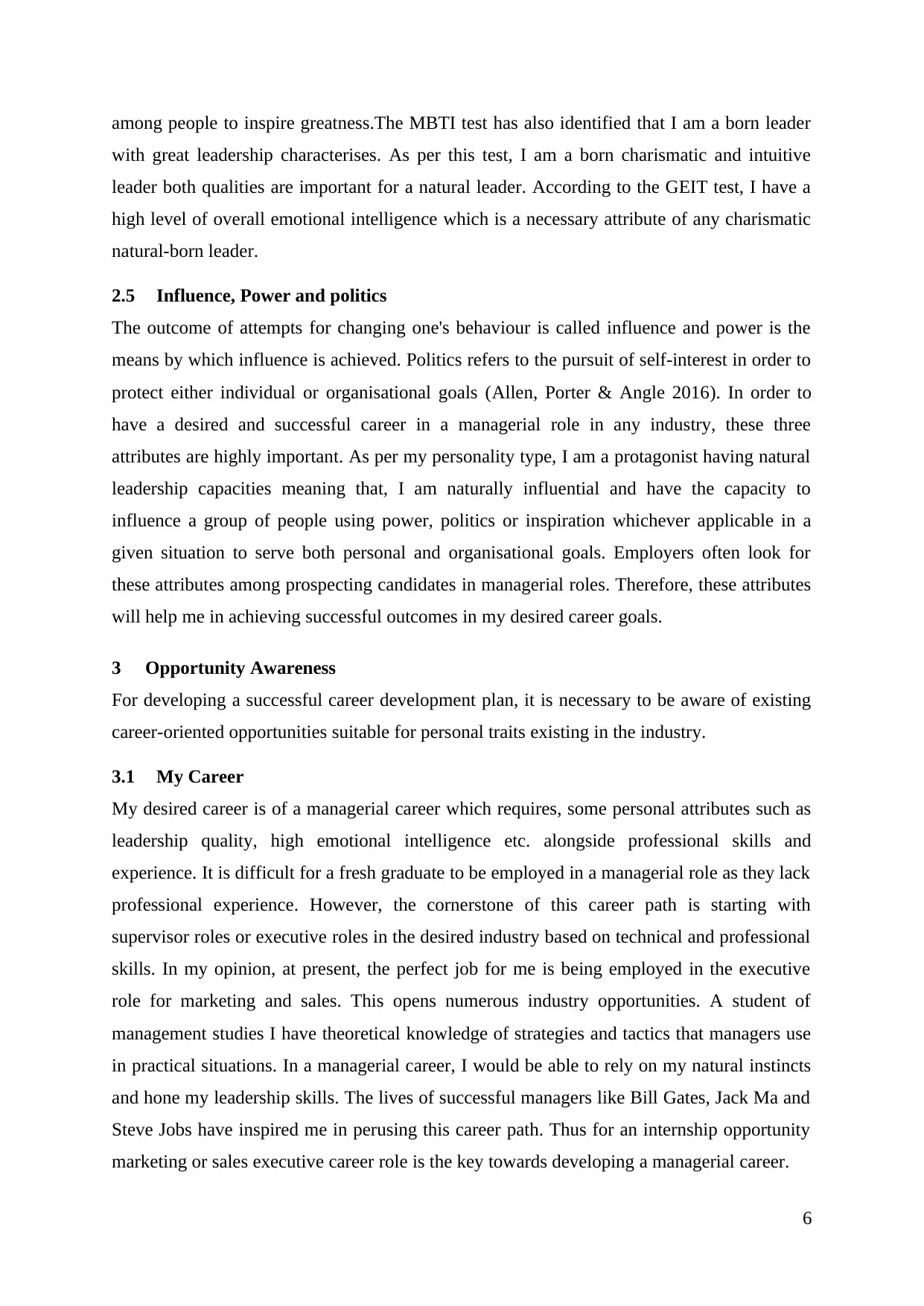
among people to inspire greatness.The MBTI test has also identified that I am a born leader
with great leadership characterises. As per this test, I am a born charismatic and intuitive
leader both qualities are important for a natural leader. According to the GEIT test, I have a
high level of overall emotional intelligence which is a necessary attribute of any charismatic
natural-born leader.
2.5 Influence, Power and politics
The outcome of attempts for changing one's behaviour is called influence and power is the
means by which influence is achieved. Politics refers to the pursuit of self-interest in order to
protect either individual or organisational goals (Allen, Porter & Angle 2016). In order to
have a desired and successful career in a managerial role in any industry, these three
attributes are highly important. As per my personality type, I am a protagonist having natural
leadership capacities meaning that, I am naturally influential and have the capacity to
influence a group of people using power, politics or inspiration whichever applicable in a
given situation to serve both personal and organisational goals. Employers often look for
these attributes among prospecting candidates in managerial roles. Therefore, these attributes
will help me in achieving successful outcomes in my desired career goals.
3 Opportunity Awareness
For developing a successful career development plan, it is necessary to be aware of existing
career-oriented opportunities suitable for personal traits existing in the industry.
3.1 My Career
My desired career is of a managerial career which requires, some personal attributes such as
leadership quality, high emotional intelligence etc. alongside professional skills and
experience. It is difficult for a fresh graduate to be employed in a managerial role as they lack
professional experience. However, the cornerstone of this career path is starting with
supervisor roles or executive roles in the desired industry based on technical and professional
skills. In my opinion, at present, the perfect job for me is being employed in the executive
role for marketing and sales. This opens numerous industry opportunities. A student of
management studies I have theoretical knowledge of strategies and tactics that managers use
in practical situations. In a managerial career, I would be able to rely on my natural instincts
and hone my leadership skills. The lives of successful managers like Bill Gates, Jack Ma and
Steve Jobs have inspired me in perusing this career path. Thus for an internship opportunity
marketing or sales executive career role is the key towards developing a managerial career.
6
with great leadership characterises. As per this test, I am a born charismatic and intuitive
leader both qualities are important for a natural leader. According to the GEIT test, I have a
high level of overall emotional intelligence which is a necessary attribute of any charismatic
natural-born leader.
2.5 Influence, Power and politics
The outcome of attempts for changing one's behaviour is called influence and power is the
means by which influence is achieved. Politics refers to the pursuit of self-interest in order to
protect either individual or organisational goals (Allen, Porter & Angle 2016). In order to
have a desired and successful career in a managerial role in any industry, these three
attributes are highly important. As per my personality type, I am a protagonist having natural
leadership capacities meaning that, I am naturally influential and have the capacity to
influence a group of people using power, politics or inspiration whichever applicable in a
given situation to serve both personal and organisational goals. Employers often look for
these attributes among prospecting candidates in managerial roles. Therefore, these attributes
will help me in achieving successful outcomes in my desired career goals.
3 Opportunity Awareness
For developing a successful career development plan, it is necessary to be aware of existing
career-oriented opportunities suitable for personal traits existing in the industry.
3.1 My Career
My desired career is of a managerial career which requires, some personal attributes such as
leadership quality, high emotional intelligence etc. alongside professional skills and
experience. It is difficult for a fresh graduate to be employed in a managerial role as they lack
professional experience. However, the cornerstone of this career path is starting with
supervisor roles or executive roles in the desired industry based on technical and professional
skills. In my opinion, at present, the perfect job for me is being employed in the executive
role for marketing and sales. This opens numerous industry opportunities. A student of
management studies I have theoretical knowledge of strategies and tactics that managers use
in practical situations. In a managerial career, I would be able to rely on my natural instincts
and hone my leadership skills. The lives of successful managers like Bill Gates, Jack Ma and
Steve Jobs have inspired me in perusing this career path. Thus for an internship opportunity
marketing or sales executive career role is the key towards developing a managerial career.
6
⊘ This is a preview!⊘
Do you want full access?
Subscribe today to unlock all pages.

Trusted by 1+ million students worldwide
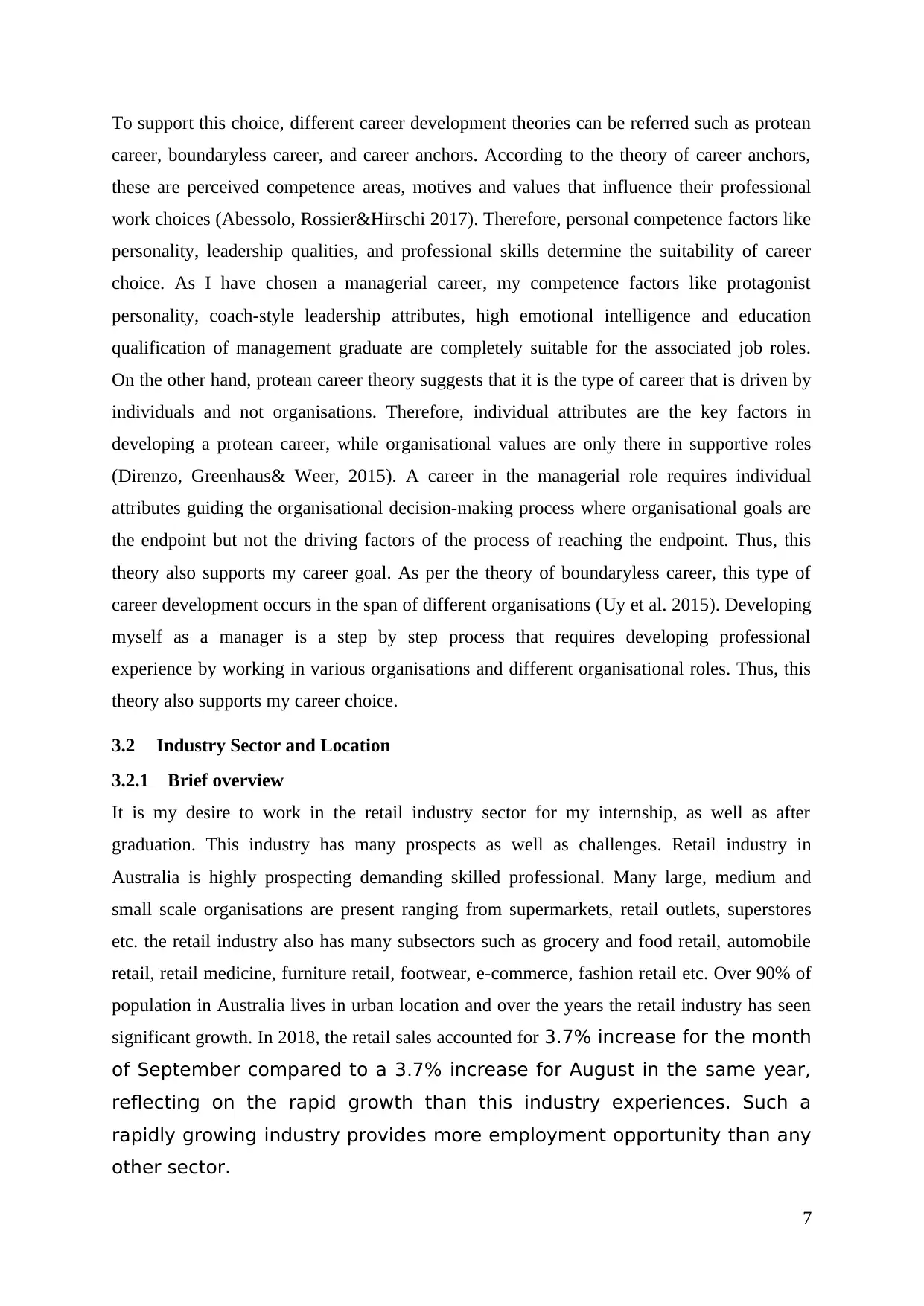
To support this choice, different career development theories can be referred such as protean
career, boundaryless career, and career anchors. According to the theory of career anchors,
these are perceived competence areas, motives and values that influence their professional
work choices (Abessolo, Rossier&Hirschi 2017). Therefore, personal competence factors like
personality, leadership qualities, and professional skills determine the suitability of career
choice. As I have chosen a managerial career, my competence factors like protagonist
personality, coach-style leadership attributes, high emotional intelligence and education
qualification of management graduate are completely suitable for the associated job roles.
On the other hand, protean career theory suggests that it is the type of career that is driven by
individuals and not organisations. Therefore, individual attributes are the key factors in
developing a protean career, while organisational values are only there in supportive roles
(Direnzo, Greenhaus& Weer, 2015). A career in the managerial role requires individual
attributes guiding the organisational decision-making process where organisational goals are
the endpoint but not the driving factors of the process of reaching the endpoint. Thus, this
theory also supports my career goal. As per the theory of boundaryless career, this type of
career development occurs in the span of different organisations (Uy et al. 2015). Developing
myself as a manager is a step by step process that requires developing professional
experience by working in various organisations and different organisational roles. Thus, this
theory also supports my career choice.
3.2 Industry Sector and Location
3.2.1 Brief overview
It is my desire to work in the retail industry sector for my internship, as well as after
graduation. This industry has many prospects as well as challenges. Retail industry in
Australia is highly prospecting demanding skilled professional. Many large, medium and
small scale organisations are present ranging from supermarkets, retail outlets, superstores
etc. the retail industry also has many subsectors such as grocery and food retail, automobile
retail, retail medicine, furniture retail, footwear, e-commerce, fashion retail etc. Over 90% of
population in Australia lives in urban location and over the years the retail industry has seen
significant growth. In 2018, the retail sales accounted for 3.7% increase for the month
of September compared to a 3.7% increase for August in the same year,
reflecting on the rapid growth than this industry experiences. Such a
rapidly growing industry provides more employment opportunity than any
other sector.
7
career, boundaryless career, and career anchors. According to the theory of career anchors,
these are perceived competence areas, motives and values that influence their professional
work choices (Abessolo, Rossier&Hirschi 2017). Therefore, personal competence factors like
personality, leadership qualities, and professional skills determine the suitability of career
choice. As I have chosen a managerial career, my competence factors like protagonist
personality, coach-style leadership attributes, high emotional intelligence and education
qualification of management graduate are completely suitable for the associated job roles.
On the other hand, protean career theory suggests that it is the type of career that is driven by
individuals and not organisations. Therefore, individual attributes are the key factors in
developing a protean career, while organisational values are only there in supportive roles
(Direnzo, Greenhaus& Weer, 2015). A career in the managerial role requires individual
attributes guiding the organisational decision-making process where organisational goals are
the endpoint but not the driving factors of the process of reaching the endpoint. Thus, this
theory also supports my career goal. As per the theory of boundaryless career, this type of
career development occurs in the span of different organisations (Uy et al. 2015). Developing
myself as a manager is a step by step process that requires developing professional
experience by working in various organisations and different organisational roles. Thus, this
theory also supports my career choice.
3.2 Industry Sector and Location
3.2.1 Brief overview
It is my desire to work in the retail industry sector for my internship, as well as after
graduation. This industry has many prospects as well as challenges. Retail industry in
Australia is highly prospecting demanding skilled professional. Many large, medium and
small scale organisations are present ranging from supermarkets, retail outlets, superstores
etc. the retail industry also has many subsectors such as grocery and food retail, automobile
retail, retail medicine, furniture retail, footwear, e-commerce, fashion retail etc. Over 90% of
population in Australia lives in urban location and over the years the retail industry has seen
significant growth. In 2018, the retail sales accounted for 3.7% increase for the month
of September compared to a 3.7% increase for August in the same year,
reflecting on the rapid growth than this industry experiences. Such a
rapidly growing industry provides more employment opportunity than any
other sector.
7
Paraphrase This Document
Need a fresh take? Get an instant paraphrase of this document with our AI Paraphraser
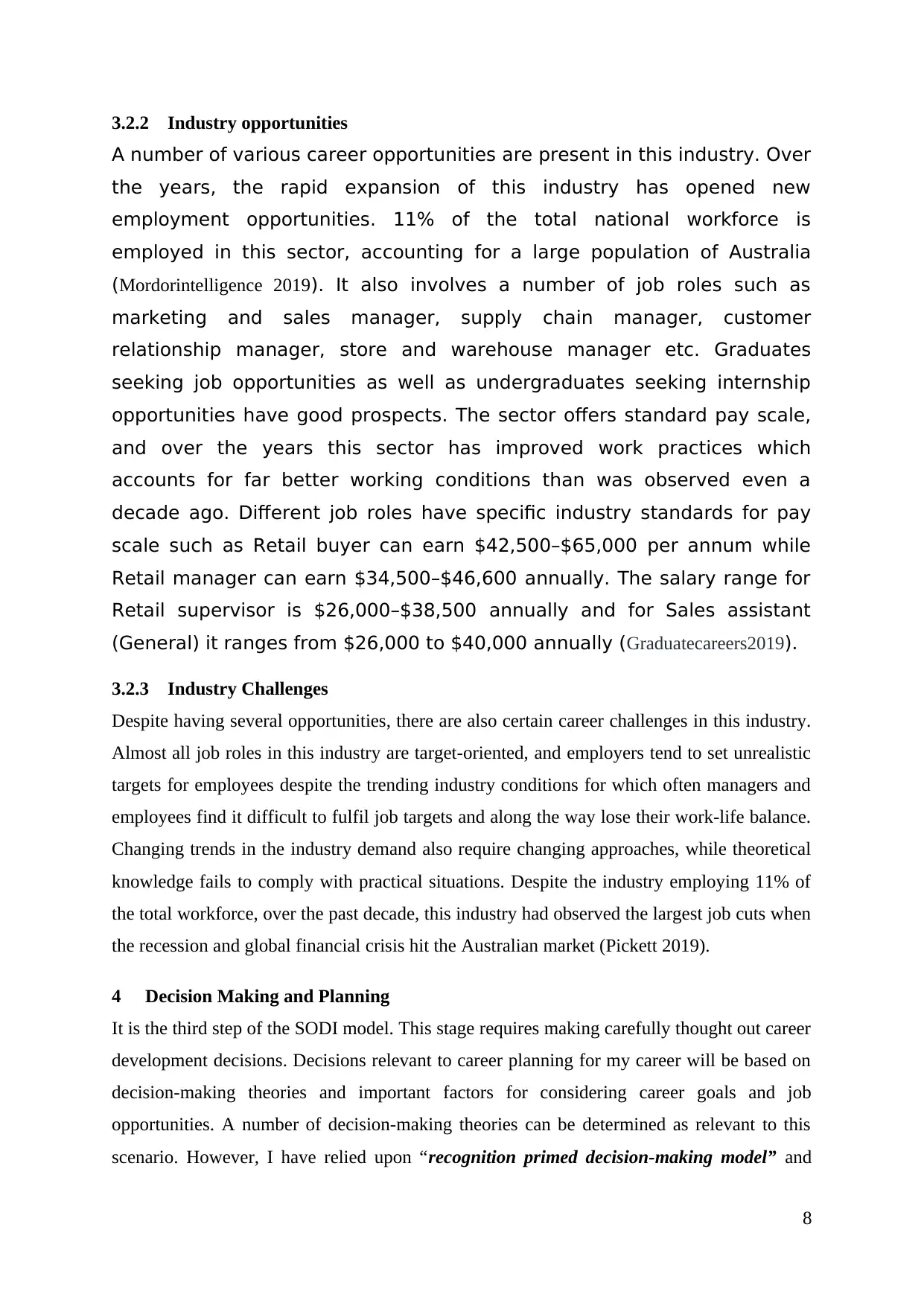
3.2.2 Industry opportunities
A number of various career opportunities are present in this industry. Over
the years, the rapid expansion of this industry has opened new
employment opportunities. 11% of the total national workforce is
employed in this sector, accounting for a large population of Australia
(Mordorintelligence 2019). It also involves a number of job roles such as
marketing and sales manager, supply chain manager, customer
relationship manager, store and warehouse manager etc. Graduates
seeking job opportunities as well as undergraduates seeking internship
opportunities have good prospects. The sector offers standard pay scale,
and over the years this sector has improved work practices which
accounts for far better working conditions than was observed even a
decade ago. Different job roles have specific industry standards for pay
scale such as Retail buyer can earn $42,500–$65,000 per annum while
Retail manager can earn $34,500–$46,600 annually. The salary range for
Retail supervisor is $26,000–$38,500 annually and for Sales assistant
(General) it ranges from $26,000 to $40,000 annually (Graduatecareers2019).
3.2.3 Industry Challenges
Despite having several opportunities, there are also certain career challenges in this industry.
Almost all job roles in this industry are target-oriented, and employers tend to set unrealistic
targets for employees despite the trending industry conditions for which often managers and
employees find it difficult to fulfil job targets and along the way lose their work-life balance.
Changing trends in the industry demand also require changing approaches, while theoretical
knowledge fails to comply with practical situations. Despite the industry employing 11% of
the total workforce, over the past decade, this industry had observed the largest job cuts when
the recession and global financial crisis hit the Australian market (Pickett 2019).
4 Decision Making and Planning
It is the third step of the SODI model. This stage requires making carefully thought out career
development decisions. Decisions relevant to career planning for my career will be based on
decision-making theories and important factors for considering career goals and job
opportunities. A number of decision-making theories can be determined as relevant to this
scenario. However, I have relied upon “recognition primed decision-making model” and
8
A number of various career opportunities are present in this industry. Over
the years, the rapid expansion of this industry has opened new
employment opportunities. 11% of the total national workforce is
employed in this sector, accounting for a large population of Australia
(Mordorintelligence 2019). It also involves a number of job roles such as
marketing and sales manager, supply chain manager, customer
relationship manager, store and warehouse manager etc. Graduates
seeking job opportunities as well as undergraduates seeking internship
opportunities have good prospects. The sector offers standard pay scale,
and over the years this sector has improved work practices which
accounts for far better working conditions than was observed even a
decade ago. Different job roles have specific industry standards for pay
scale such as Retail buyer can earn $42,500–$65,000 per annum while
Retail manager can earn $34,500–$46,600 annually. The salary range for
Retail supervisor is $26,000–$38,500 annually and for Sales assistant
(General) it ranges from $26,000 to $40,000 annually (Graduatecareers2019).
3.2.3 Industry Challenges
Despite having several opportunities, there are also certain career challenges in this industry.
Almost all job roles in this industry are target-oriented, and employers tend to set unrealistic
targets for employees despite the trending industry conditions for which often managers and
employees find it difficult to fulfil job targets and along the way lose their work-life balance.
Changing trends in the industry demand also require changing approaches, while theoretical
knowledge fails to comply with practical situations. Despite the industry employing 11% of
the total workforce, over the past decade, this industry had observed the largest job cuts when
the recession and global financial crisis hit the Australian market (Pickett 2019).
4 Decision Making and Planning
It is the third step of the SODI model. This stage requires making carefully thought out career
development decisions. Decisions relevant to career planning for my career will be based on
decision-making theories and important factors for considering career goals and job
opportunities. A number of decision-making theories can be determined as relevant to this
scenario. However, I have relied upon “recognition primed decision-making model” and
8
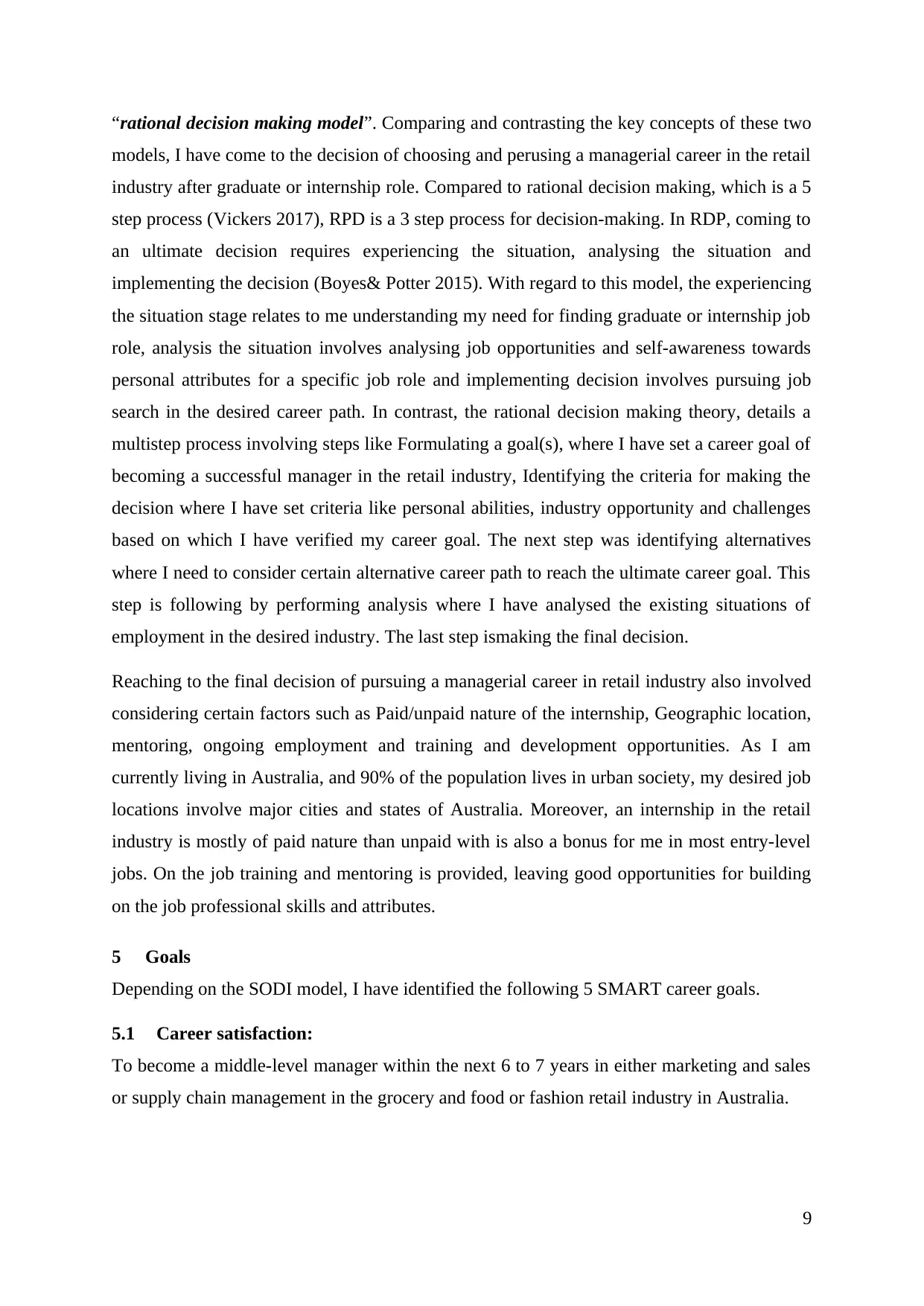
“rational decision making model”. Comparing and contrasting the key concepts of these two
models, I have come to the decision of choosing and perusing a managerial career in the retail
industry after graduate or internship role. Compared to rational decision making, which is a 5
step process (Vickers 2017), RPD is a 3 step process for decision-making. In RDP, coming to
an ultimate decision requires experiencing the situation, analysing the situation and
implementing the decision (Boyes& Potter 2015). With regard to this model, the experiencing
the situation stage relates to me understanding my need for finding graduate or internship job
role, analysis the situation involves analysing job opportunities and self-awareness towards
personal attributes for a specific job role and implementing decision involves pursuing job
search in the desired career path. In contrast, the rational decision making theory, details a
multistep process involving steps like Formulating a goal(s), where I have set a career goal of
becoming a successful manager in the retail industry, Identifying the criteria for making the
decision where I have set criteria like personal abilities, industry opportunity and challenges
based on which I have verified my career goal. The next step was identifying alternatives
where I need to consider certain alternative career path to reach the ultimate career goal. This
step is following by performing analysis where I have analysed the existing situations of
employment in the desired industry. The last step ismaking the final decision.
Reaching to the final decision of pursuing a managerial career in retail industry also involved
considering certain factors such as Paid/unpaid nature of the internship, Geographic location,
mentoring, ongoing employment and training and development opportunities. As I am
currently living in Australia, and 90% of the population lives in urban society, my desired job
locations involve major cities and states of Australia. Moreover, an internship in the retail
industry is mostly of paid nature than unpaid with is also a bonus for me in most entry-level
jobs. On the job training and mentoring is provided, leaving good opportunities for building
on the job professional skills and attributes.
5 Goals
Depending on the SODI model, I have identified the following 5 SMART career goals.
5.1 Career satisfaction:
To become a middle-level manager within the next 6 to 7 years in either marketing and sales
or supply chain management in the grocery and food or fashion retail industry in Australia.
9
models, I have come to the decision of choosing and perusing a managerial career in the retail
industry after graduate or internship role. Compared to rational decision making, which is a 5
step process (Vickers 2017), RPD is a 3 step process for decision-making. In RDP, coming to
an ultimate decision requires experiencing the situation, analysing the situation and
implementing the decision (Boyes& Potter 2015). With regard to this model, the experiencing
the situation stage relates to me understanding my need for finding graduate or internship job
role, analysis the situation involves analysing job opportunities and self-awareness towards
personal attributes for a specific job role and implementing decision involves pursuing job
search in the desired career path. In contrast, the rational decision making theory, details a
multistep process involving steps like Formulating a goal(s), where I have set a career goal of
becoming a successful manager in the retail industry, Identifying the criteria for making the
decision where I have set criteria like personal abilities, industry opportunity and challenges
based on which I have verified my career goal. The next step was identifying alternatives
where I need to consider certain alternative career path to reach the ultimate career goal. This
step is following by performing analysis where I have analysed the existing situations of
employment in the desired industry. The last step ismaking the final decision.
Reaching to the final decision of pursuing a managerial career in retail industry also involved
considering certain factors such as Paid/unpaid nature of the internship, Geographic location,
mentoring, ongoing employment and training and development opportunities. As I am
currently living in Australia, and 90% of the population lives in urban society, my desired job
locations involve major cities and states of Australia. Moreover, an internship in the retail
industry is mostly of paid nature than unpaid with is also a bonus for me in most entry-level
jobs. On the job training and mentoring is provided, leaving good opportunities for building
on the job professional skills and attributes.
5 Goals
Depending on the SODI model, I have identified the following 5 SMART career goals.
5.1 Career satisfaction:
To become a middle-level manager within the next 6 to 7 years in either marketing and sales
or supply chain management in the grocery and food or fashion retail industry in Australia.
9
⊘ This is a preview!⊘
Do you want full access?
Subscribe today to unlock all pages.

Trusted by 1+ million students worldwide
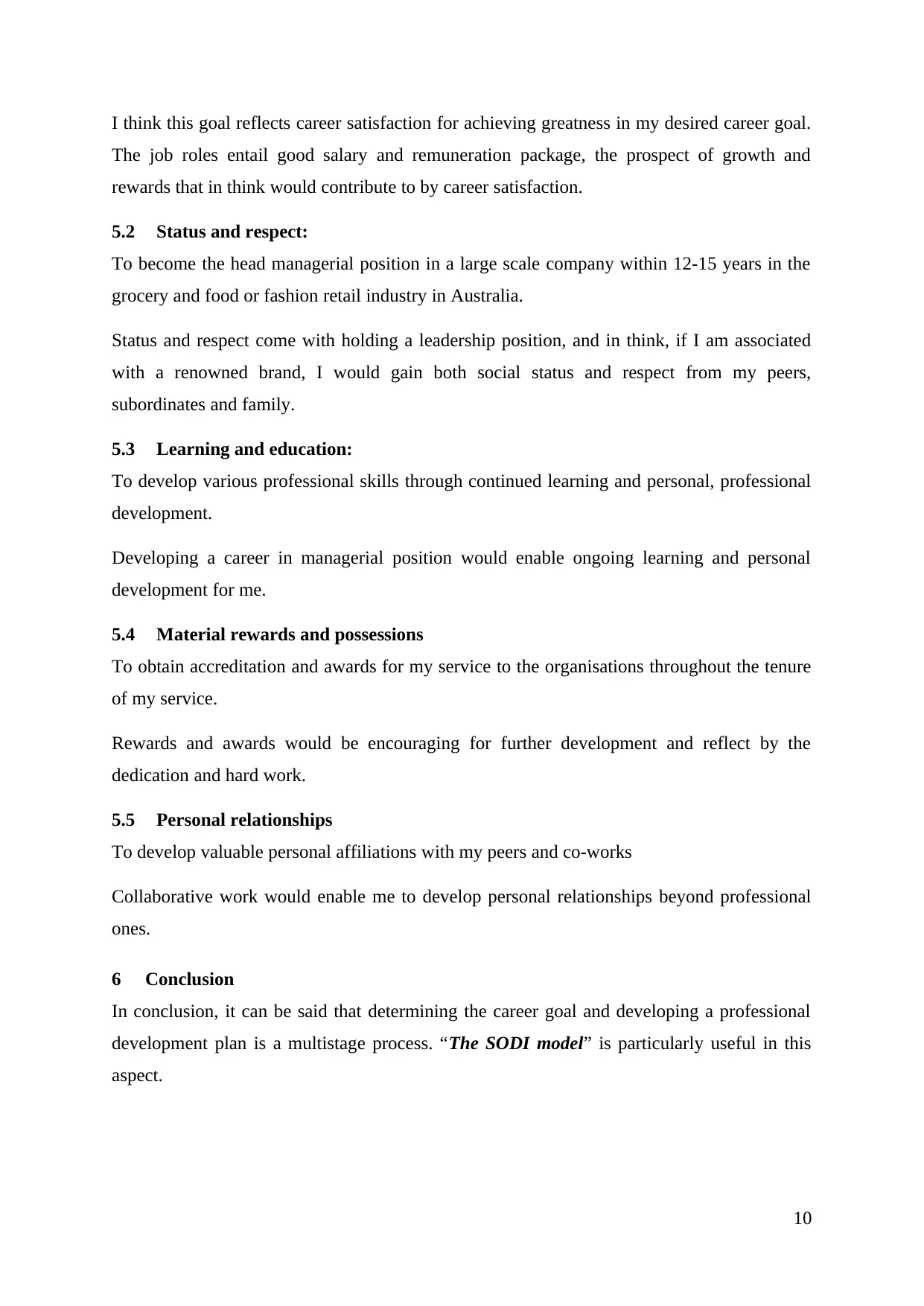
I think this goal reflects career satisfaction for achieving greatness in my desired career goal.
The job roles entail good salary and remuneration package, the prospect of growth and
rewards that in think would contribute to by career satisfaction.
5.2 Status and respect:
To become the head managerial position in a large scale company within 12-15 years in the
grocery and food or fashion retail industry in Australia.
Status and respect come with holding a leadership position, and in think, if I am associated
with a renowned brand, I would gain both social status and respect from my peers,
subordinates and family.
5.3 Learning and education:
To develop various professional skills through continued learning and personal, professional
development.
Developing a career in managerial position would enable ongoing learning and personal
development for me.
5.4 Material rewards and possessions
To obtain accreditation and awards for my service to the organisations throughout the tenure
of my service.
Rewards and awards would be encouraging for further development and reflect by the
dedication and hard work.
5.5 Personal relationships
To develop valuable personal affiliations with my peers and co-works
Collaborative work would enable me to develop personal relationships beyond professional
ones.
6 Conclusion
In conclusion, it can be said that determining the career goal and developing a professional
development plan is a multistage process. “The SODI model” is particularly useful in this
aspect.
10
The job roles entail good salary and remuneration package, the prospect of growth and
rewards that in think would contribute to by career satisfaction.
5.2 Status and respect:
To become the head managerial position in a large scale company within 12-15 years in the
grocery and food or fashion retail industry in Australia.
Status and respect come with holding a leadership position, and in think, if I am associated
with a renowned brand, I would gain both social status and respect from my peers,
subordinates and family.
5.3 Learning and education:
To develop various professional skills through continued learning and personal, professional
development.
Developing a career in managerial position would enable ongoing learning and personal
development for me.
5.4 Material rewards and possessions
To obtain accreditation and awards for my service to the organisations throughout the tenure
of my service.
Rewards and awards would be encouraging for further development and reflect by the
dedication and hard work.
5.5 Personal relationships
To develop valuable personal affiliations with my peers and co-works
Collaborative work would enable me to develop personal relationships beyond professional
ones.
6 Conclusion
In conclusion, it can be said that determining the career goal and developing a professional
development plan is a multistage process. “The SODI model” is particularly useful in this
aspect.
10
Paraphrase This Document
Need a fresh take? Get an instant paraphrase of this document with our AI Paraphraser
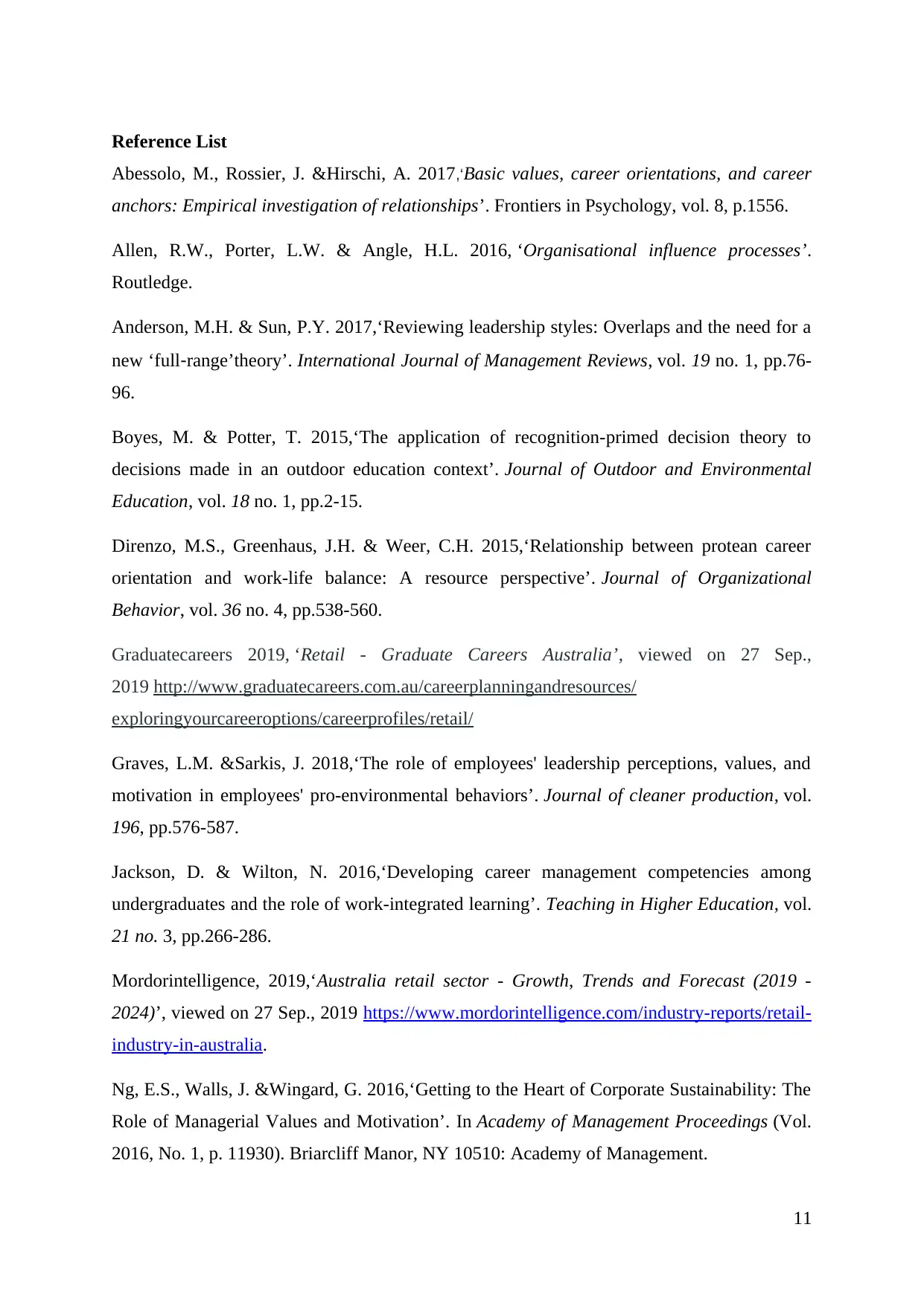
Reference List
Abessolo, M., Rossier, J. &Hirschi, A. 2017,‘Basic values, career orientations, and career
anchors: Empirical investigation of relationships’. Frontiers in Psychology, vol. 8, p.1556.
Allen, R.W., Porter, L.W. & Angle, H.L. 2016, ‘Organisational influence processes’.
Routledge.
Anderson, M.H. & Sun, P.Y. 2017,‘Reviewing leadership styles: Overlaps and the need for a
new ‘full‐range’theory’. International Journal of Management Reviews, vol. 19 no. 1, pp.76-
96.
Boyes, M. & Potter, T. 2015,‘The application of recognition-primed decision theory to
decisions made in an outdoor education context’. Journal of Outdoor and Environmental
Education, vol. 18 no. 1, pp.2-15.
Direnzo, M.S., Greenhaus, J.H. & Weer, C.H. 2015,‘Relationship between protean career
orientation and work-life balance: A resource perspective’. Journal of Organizational
Behavior, vol. 36 no. 4, pp.538-560.
Graduatecareers 2019, ‘Retail - Graduate Careers Australia’, viewed on 27 Sep.,
2019 http://www.graduatecareers.com.au/careerplanningandresources/
exploringyourcareeroptions/careerprofiles/retail/
Graves, L.M. &Sarkis, J. 2018,‘The role of employees' leadership perceptions, values, and
motivation in employees' pro-environmental behaviors’. Journal of cleaner production, vol.
196, pp.576-587.
Jackson, D. & Wilton, N. 2016,‘Developing career management competencies among
undergraduates and the role of work-integrated learning’. Teaching in Higher Education, vol.
21 no. 3, pp.266-286.
Mordorintelligence, 2019,‘Australia retail sector - Growth, Trends and Forecast (2019 -
2024)’, viewed on 27 Sep., 2019 https://www.mordorintelligence.com/industry-reports/retail-
industry-in-australia.
Ng, E.S., Walls, J. &Wingard, G. 2016,‘Getting to the Heart of Corporate Sustainability: The
Role of Managerial Values and Motivation’. In Academy of Management Proceedings (Vol.
2016, No. 1, p. 11930). Briarcliff Manor, NY 10510: Academy of Management.
11
Abessolo, M., Rossier, J. &Hirschi, A. 2017,‘Basic values, career orientations, and career
anchors: Empirical investigation of relationships’. Frontiers in Psychology, vol. 8, p.1556.
Allen, R.W., Porter, L.W. & Angle, H.L. 2016, ‘Organisational influence processes’.
Routledge.
Anderson, M.H. & Sun, P.Y. 2017,‘Reviewing leadership styles: Overlaps and the need for a
new ‘full‐range’theory’. International Journal of Management Reviews, vol. 19 no. 1, pp.76-
96.
Boyes, M. & Potter, T. 2015,‘The application of recognition-primed decision theory to
decisions made in an outdoor education context’. Journal of Outdoor and Environmental
Education, vol. 18 no. 1, pp.2-15.
Direnzo, M.S., Greenhaus, J.H. & Weer, C.H. 2015,‘Relationship between protean career
orientation and work-life balance: A resource perspective’. Journal of Organizational
Behavior, vol. 36 no. 4, pp.538-560.
Graduatecareers 2019, ‘Retail - Graduate Careers Australia’, viewed on 27 Sep.,
2019 http://www.graduatecareers.com.au/careerplanningandresources/
exploringyourcareeroptions/careerprofiles/retail/
Graves, L.M. &Sarkis, J. 2018,‘The role of employees' leadership perceptions, values, and
motivation in employees' pro-environmental behaviors’. Journal of cleaner production, vol.
196, pp.576-587.
Jackson, D. & Wilton, N. 2016,‘Developing career management competencies among
undergraduates and the role of work-integrated learning’. Teaching in Higher Education, vol.
21 no. 3, pp.266-286.
Mordorintelligence, 2019,‘Australia retail sector - Growth, Trends and Forecast (2019 -
2024)’, viewed on 27 Sep., 2019 https://www.mordorintelligence.com/industry-reports/retail-
industry-in-australia.
Ng, E.S., Walls, J. &Wingard, G. 2016,‘Getting to the Heart of Corporate Sustainability: The
Role of Managerial Values and Motivation’. In Academy of Management Proceedings (Vol.
2016, No. 1, p. 11930). Briarcliff Manor, NY 10510: Academy of Management.
11
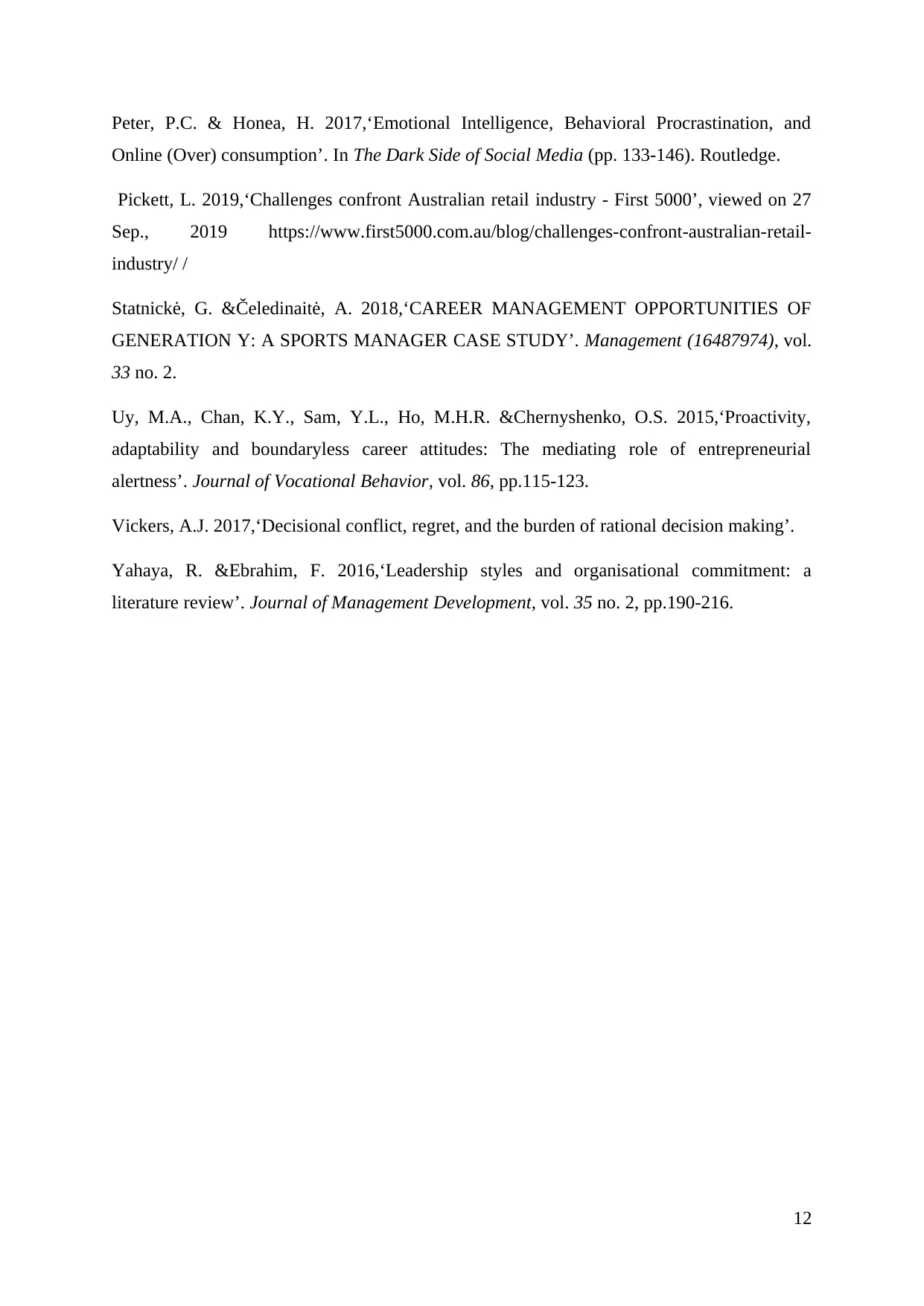
Peter, P.C. & Honea, H. 2017,‘Emotional Intelligence, Behavioral Procrastination, and
Online (Over) consumption’. In The Dark Side of Social Media (pp. 133-146). Routledge.
Pickett, L. 2019,‘Challenges confront Australian retail industry - First 5000’, viewed on 27
Sep., 2019 https://www.first5000.com.au/blog/challenges-confront-australian-retail-
industry/ /
Statnickė, G. &Čeledinaitė, A. 2018,‘CAREER MANAGEMENT OPPORTUNITIES OF
GENERATION Y: A SPORTS MANAGER CASE STUDY’. Management (16487974), vol.
33 no. 2.
Uy, M.A., Chan, K.Y., Sam, Y.L., Ho, M.H.R. &Chernyshenko, O.S. 2015,‘Proactivity,
adaptability and boundaryless career attitudes: The mediating role of entrepreneurial
alertness’. Journal of Vocational Behavior, vol. 86, pp.115-123.
Vickers, A.J. 2017,‘Decisional conflict, regret, and the burden of rational decision making’.
Yahaya, R. &Ebrahim, F. 2016,‘Leadership styles and organisational commitment: a
literature review’. Journal of Management Development, vol. 35 no. 2, pp.190-216.
12
Online (Over) consumption’. In The Dark Side of Social Media (pp. 133-146). Routledge.
Pickett, L. 2019,‘Challenges confront Australian retail industry - First 5000’, viewed on 27
Sep., 2019 https://www.first5000.com.au/blog/challenges-confront-australian-retail-
industry/ /
Statnickė, G. &Čeledinaitė, A. 2018,‘CAREER MANAGEMENT OPPORTUNITIES OF
GENERATION Y: A SPORTS MANAGER CASE STUDY’. Management (16487974), vol.
33 no. 2.
Uy, M.A., Chan, K.Y., Sam, Y.L., Ho, M.H.R. &Chernyshenko, O.S. 2015,‘Proactivity,
adaptability and boundaryless career attitudes: The mediating role of entrepreneurial
alertness’. Journal of Vocational Behavior, vol. 86, pp.115-123.
Vickers, A.J. 2017,‘Decisional conflict, regret, and the burden of rational decision making’.
Yahaya, R. &Ebrahim, F. 2016,‘Leadership styles and organisational commitment: a
literature review’. Journal of Management Development, vol. 35 no. 2, pp.190-216.
12
⊘ This is a preview!⊘
Do you want full access?
Subscribe today to unlock all pages.

Trusted by 1+ million students worldwide
1 out of 14
Related Documents
Your All-in-One AI-Powered Toolkit for Academic Success.
+13062052269
info@desklib.com
Available 24*7 on WhatsApp / Email
![[object Object]](/_next/static/media/star-bottom.7253800d.svg)
Unlock your academic potential
Copyright © 2020–2025 A2Z Services. All Rights Reserved. Developed and managed by ZUCOL.




